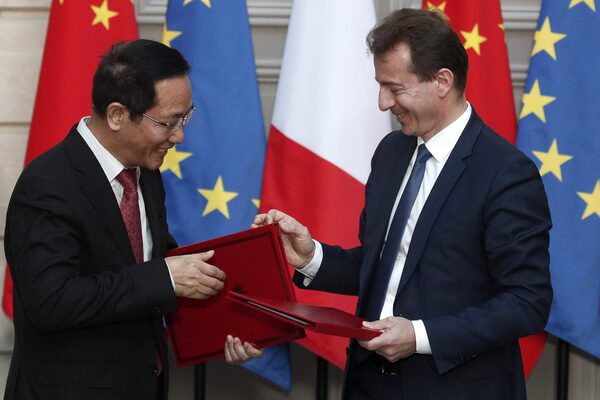
President of Airbus's commercial aircraft business Guillaume Faury, right, and Chairman of China Aviation Supplies Co. (CASC) Jia Baojun shake hands during an agreement signing ceremony at the Elysee Palace in Paris, on March 25, 2019, as part of a state visit. (Photo by Yoan VALAT / POOL / AFP)YOAN VALAT/AFP/Getty ImagesYOAN VALAT/AFP/Getty Images
Airbus shares rose on Tuesday after the European plane maker won a deal worth tens of billions of dollars to sell 300 aircraft to China.
Airbus was up 2.7 percent by 1208 GMT, with the stock having risen nearly 40 percent so far in 2019.
French officials said the deal was worth some 30 billion euros (25.6 billion pounds) at catalogue prices. Plane makers usually grant significant discounts.
The Chinese order was announced late on Monday, coinciding with a visit to Europe by Chinese President Xi Jinping and matching a China record held by U.S. rival Boeing.
Investment bank Citigroup kept its “buy” rating on Airbus.
“We do not have details of the delivery schedule of this order, but China has been taking about 20-25 percent of Airbus production per year and given the A320 family is sold out at announced production rates out to 2024/25, we believe this increases the probability of Airbus moving to a production rate of 70 per month,” wrote Citigroup.
That positive view was echoed by Morgan Stanley, which kept an “overweight” rating on Airbus shares.
“Clearly finalization of this order is a positive for Airbus, and continues to underpin strong order book coverage and rising production rates in narrowbody,” Morgan Stanley said.
The larger-than-expected order, which matches an order for 300 Boeing planes when U.S. Donald Trump visited Beijing in 2017, follows a year-long vacuum of purchases in which China failed to place significant orders amid global trade tensions.
It also comes as the grounding of the Boeing 737 MAX has left uncertainty over Boeing’s immediate hopes for a major jet order as the result of any warming of U.S.-China trade ties.